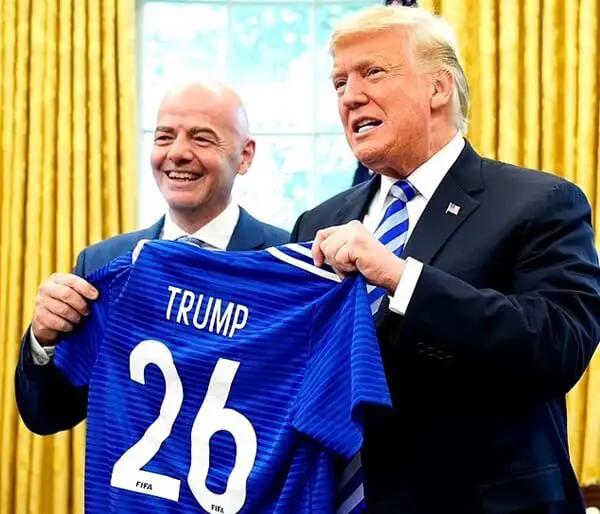
FIFA President Advocates for Russia's Return to International Competitions
In a move that has ignited debate within the football community, FIFA President Gianni Infantino recently expressed a strong desire for Russia's re-entry into international football competitions. His remarks, made during a press conference, underscored his belief in the sport's potential to bridge divides amidst complex geopolitical tensions. "That’s what we have to cheer for; that’s what we have to pray for, because that’s what football is about," Infantino stated, emphasizing the unifying nature of football. "It’s not about not dividing; it’s about uniting girls, uniting boys, uniting people from wherever they are. And how do we unite? Well, we unite through competitions."

Context of Infantino's Statement
Infantino's comments come in the wake of ongoing discussions regarding Russia's participation in global tournaments, particularly following its suspension from various competitions due to the country's actions in Ukraine. The implications of these actions have reverberated across the sports world, leading to a significant reevaluation of how international sport interacts with global politics. FIFA’s decision to impose sanctions on Russia in 2022, which included barring its national teams and clubs from international competitions, has led to a chilling effect on the nation’s footballing ambitions.
While Infantino's advocacy for inclusion raises questions about the politicization of sport, it also reflects a broader trend in which sports organizations grapple with their roles as both governing bodies and platforms for diplomacy. The FIFA President’s words can be interpreted as an appeal not only to the footballing community but also to world leaders, urging a reconciliation that he believes can be fostered through the global language of sports.
The Geopolitical Landscape
The backdrop of Infantino's comments is rife with complexities. The intersection of sports and politics has always been a contentious issue, with instances such as the 1980 Moscow Olympics and the 1984 Los Angeles Olympics serving as historical reminders of how sports can be influenced by international relations. Infantino’s perspective aligns with a growing sentiment among some in the football community who see potential for sports to act as a catalyst for peace.
However, the call for Russia's reintegration is met with skepticism from various stakeholders. Critics argue that acknowledging Russia in international competitions could undermine the principles of accountability and justice regarding its actions. The potential for backlash is significant, with many fearing that the move could be perceived as FIFA prioritizing financial gains and global representation over ethical considerations.
Voices from the Football Community
Reactions to Infantino's statement have been polarized. Some former players and analysts have voiced their support for the idea of inclusivity, arguing that football should transcend political barriers. "Sport has historically been a bridge in times of conflict," remarked former England international Gary Lineker. "If we can use football as a tool for peace, we should explore that possibility."
Conversely, others within the sport feel strongly that Russia should remain excluded until there is a substantive change in its geopolitical stance. "Allowing Russia back into the fold sends the wrong message," noted sports journalist Rebecca Lowe. "It suggests that the consequences of actions can be easily dismissed when it comes to the allure of competition."
The Tension between Unity and Accountability
FIFA's internal policies regarding disciplinary actions and reinstatements reflect a complex balancing act. On one hand, there is a clear need to uphold the integrity of the sport and promote fair play. On the other hand, there is a pressing desire to foster unity through the global appeal of football. Infantino’s remarks signal an attempt to navigate these waters, but they also highlight the inherent tension in reconciling sports with accountability.
Statistics show that the global football audience is vast, with over 3.5 billion fans tuning into the FIFA World Cup every four years. This immense viewership creates an economic incentive for FIFA to consider the reintroduction of nations like Russia, which historically have a strong footballing heritage and a passionate following. Yet, the question remains: at what cost?
Moving Forward
As FIFA continues to deliberate on this contentious issue, the future of Russian football participation in international competitions hangs in the balance. The organization is expected to engage in further discussions with its member associations, weighing the potential impacts on both the sport and its global image.
In the meantime, Infantino’s comments have undoubtedly reignited conversations about the intersection of sports and politics, prompting a reassessment of how football can be both a unifying force and a reflection of global realities. As the football world watches closely, the ongoing debate serves as a reminder that the beautiful game is often entangled in the complexities of international relations.

Ultimately, the question may not just be whether Russia should return to FIFA competitions, but how the sport can evolve to maintain its integrity while striving for inclusivity. The dialogue around these issues will undoubtedly shape the future of international football in a world that demands accountability alongside unity.
For further reading on this topic, you can refer to the full article on Yahoo Sports.